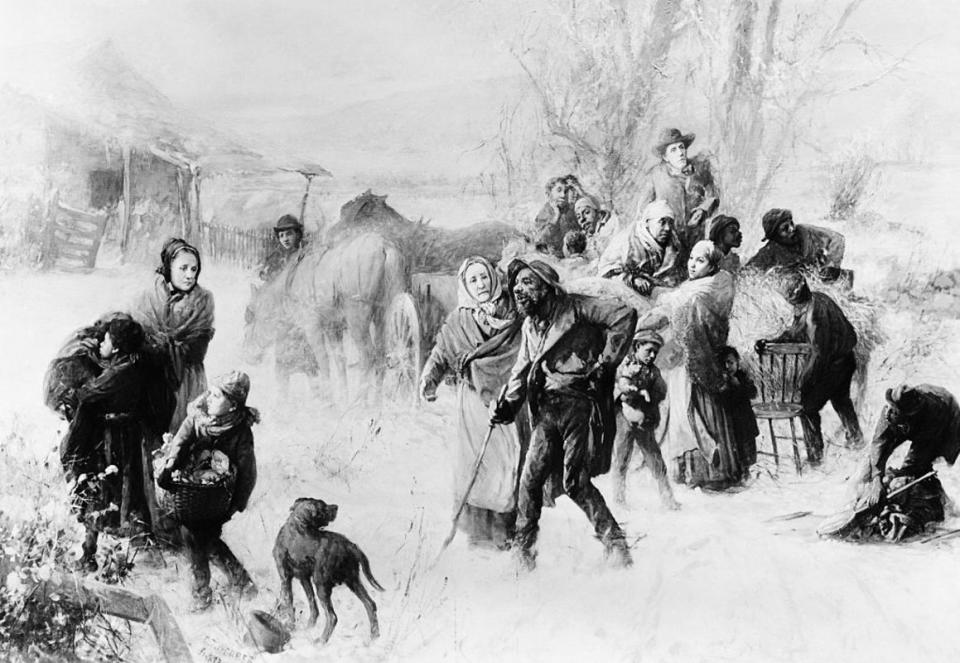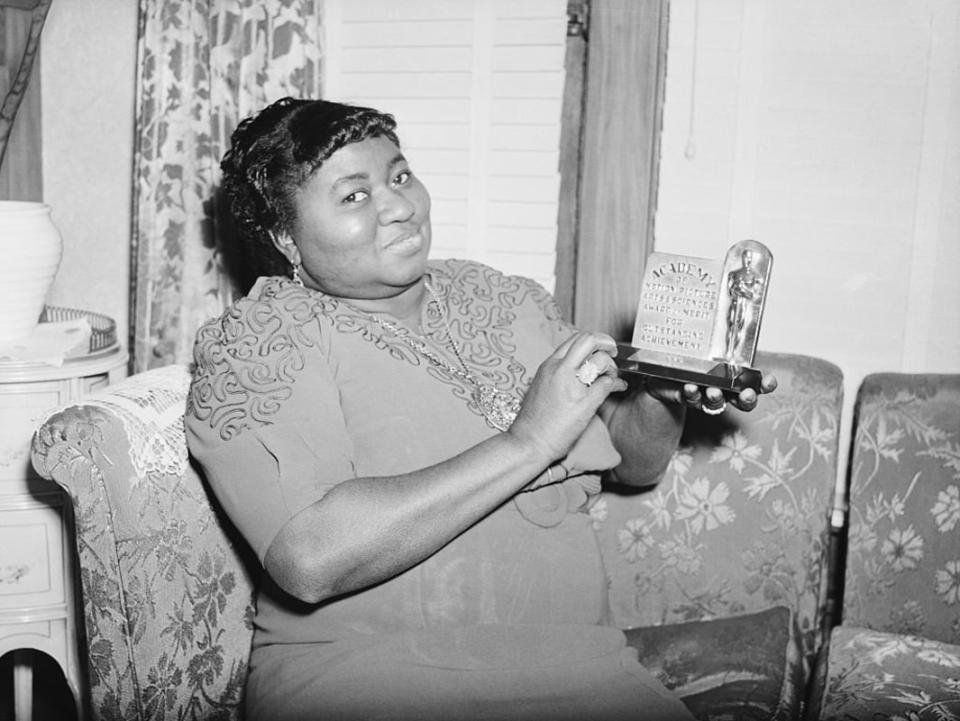In Honor of Black History Month, 30 Black History Facts You May Not Be Aware Of

- Oops!Something went wrong.Please try again later.
- Oops!Something went wrong.Please try again later.
- Oops!Something went wrong.Please try again later.
- Oops!Something went wrong.Please try again later.
Martin Luther King, Jr. speaking at the March on Washington.
From trailblazers to inventors, Olympians, and politicians, numerous Black historical figures have left their marks on American history for decades. Unfortunately, a lot of their accomplishments are unsung and under-acknowledged. Their achievements were silenced under the weight of slavery and Jim Crow segregation laws. Despite the ugly side of history and its racial divide, African Americans still managed to pave the way for historical landmark moments even today. From laying down the blueprint for safety measures that you use daily like the elevator, and traffic lights, to the diversity that we can now watch on television, Black history is rich in America. So, in honor of Black History Month, here are some well-known and little-known facts that you may not have been aware of.
Related: Black History Month Themes Through the Years (1928-2024)
Black History Facts
Society:
1. Dr. Carter G. Woodson, known as the “Father of Black History,” started the first Negro History Week in 1926 to ensure students would learn Black history. It grew into Black History Month starting in 1976.
2. William Tucker was the first known Black person to be born in the 13 colonies. He was born near Jamestown, Virginia in 1624. His parents were indentured servants and part of the first group of Africans brought to colonial soil by Great Britain. In 1634, his parents participated in the establishment of Elizabeth City County, Virginia which is now the city of Hampton.
3. In 1738, a group of newly freed men and women founded the town Gracia Real De Santa Teresa De Mose, Florida. There were an estimated 100 people in the town’s population. Just two miles away from St. Augustine, it's considered to be the first-ever free Black settlement in the U.S. It was abandoned following the Seven Years' War in 1763. In 1994, it was designated a National Historic Landmark.
4. It's estimated that around 100,000 slaves escaped to the North via the Underground Railroad between 1810 and 1850.

Getty Images
5. On July 2, 1777, Vermont became the first colony to ban slavery. Vermont's legislature agreed to abolish slavery entirely, and it also moved to provide full voting rights for African American males.
6. Educator and abolitionist Lucy Stanton was the first Black woman to graduate from college. She completed a ladies' literary program and graduated from Oberlin College in 1850. Her commencement speech was an appeal for anti-slavery.
Related: 30 Black Historical Figures to Celebrate During Black History Month
7. Allensworth is the first all-Black Californian township, founded and financed by African Americans. Created by Lieutenant Colonel Allen Allensworth in 1908, the town was built with the intention of establishing a self-sufficient city where African Americans could live their lives free of prejudice.
8. Cathay Williams was the first and only known female Buffalo Soldier. Williams was born into slavery and worked for the Union Army during the Civil War. She posed as a man and enlisted as William Cathay in the 38th infantry in 1866, and was given a medical discharge in 1868.
Inventors:
9. George “Crum” Speck, a chef and restaurant owner is said to have created the potato chip by accident during the summer of 1853. However, his sister, Kate, claimed she actually created the chip after a potato slice fell into a hot frying pan creating the famous Saratoga chips. Crum’s chips remained a local delicacy in New York until the 1920s when a salesman named Herman Lay (yes, of Lays chips) began traveling throughout the south and introducing potato chips to different communities.
10. Garrett Morgan’s inventions continue to save lives. His take on the traffic signal, which he patented in 1922, was the first to offer a third “caution” signal which is now known as the yellow light. Take his traffic signal, which he patented in 1922. In 1912, Morgan received a patent for his “Breathing Device,” which was one of the earliest versions of a gas mask. He was also the first African American man to own a car in Cleveland, Ohio.
11. Alexander Miles’s elevator design made riding on elevators safer. Previously, elevators were operated manually; people had to consciously open and close the doors of both the elevator and the shaft every time. In 1887, Miles obtained the patent for his invention including a flexible belt attached to the elevator cage, allowing the doors to function automatically. He was inducted into the National Inventors Hall of Fame in 2007.
12. Mary Beatrice Davidson Kenner patented the sanitary belt in 1957 even though she created it in the 1920s. The belt was adjustable and had a moisture-proof napkin pocket and helped to hold pads in place from causing leakage.
13. Agricultural scientist George Carver was responsible for developing 300 new products made from peanuts including milk, flour, ink, soap, medicinal oils, and cosmetics. He created 118 products from sweet potatoes, including flour, vinegar, ink, and postage stamp glue.
14. Computer scientist and engineer Mark Dean is a co-inventor of IBM’s original personal computer, and the PC color monitor, changing the face of technology. He also co-created the technology that enables printers, keyboards, disk drives, and monitors to be plugged directly into computers.
Sports:
15. Founded in 1984, The Bill Pickett Invitational Rodeo is the only touring African American rodeo in the world.
16. In 2012, at the London Olympics, Gabby Douglas became the first Black gymnast to win an Olympic gold medal in gymnastics, as well as the first U.S. gymnast to win the all-around and team titles at the same Olympic Games.

Streeter Lecka/Getty Images
17. On September 7, 1960, Wilma Rudolph made Olympic history by becoming the first woman, and the first African American woman, to win three gold medals. She became known as the fastest woman in the world.
18. In 1996, Sheryl Swoopes became the first player to sign with the WNBA, with the league debuting a year later.
Related: 75 James Baldwin Quotes That Tell the Story of Black America
Politics:
19. Martin Luther King Jr. was assassinated on Maya Angelou's birthday, on April 4, 1968. Angelou stopped celebrating her birthday for years afterward, and sent flowers to King's widow, Coretta Scott King, for more than 30 years, until Coretta's death in 2006.
20. The Godfather of Soul, James Brown, performed in front of a televised audience in Boston the day after Martin Luther King Jr. was assassinated. Brown is credited for preventing further riots with the performance.
21. Hiram Rhodes Revels was the first African American ever elected to the U.S. Senate. He represented the state of Mississippi from February 1870 to March 1871.
22. Before former President Barack Obama took office, George Edwin Taylor paved the way when he ran for president as a member of the National Negro Liberty Party in 1904.

Alex Wong/Getty Images
23. African American fashion designer Ann Lowe designed the ivory silk taffeta wedding dress of Jacqueline Kennedy Onassis when she married President John F. Kennedy.
24. Robert Johnson became the first African American billionaire when he sold the cable station he founded, Black Entertainment Television (BET) in 2001.
Arts & Entertainment:
25. The cartoon character Betty Boop was based on Esther Jones, a Harlem-based jazz singer. Jones was known for her use of “boops” in her singing which was called a child-like scat.
26. The Proud Family was Disney Channel’s first original animated series about the life of a young Black girl, 14-year-old Penny Proud.
Related: 41 Best Black Comedy Movies of All Time
27. In 1940, Hattie McDaniel became the first Black person to win an Oscar for her supporting role in Gone With the Wind. 24 years later, Sidney Poitier became the first Black man to win an Oscar for his leading role in Lilies of the Field.

Getty Images
28. Hailed as "Hip-Hop's First Godmother," singer and music producer Sylvia Robinson produced the first-ever commercially successful rap record: "Rapper's Delight" by The Sugarhill Gang. She co-owned the first hip-hop label, Sugar Hill Records with her husband.
29. Former President Barack Obama has won two Grammy Awards. He was first honored in 2005 for the audio version of his memoir, Dreams from My Father (best-spoken word album), and received his second Grammy (in the same category) in 2007 for his political work, The Audacity of Hope. In 2022, he was nominated for the audio version of his book A Promised Land.
30. The National Museum of African American Music (NMAAM) opened in 2021 and is the only museum dedicated to preserving the legacy and celebrating the accomplishments of the many music genres created, influenced, or inspired by African Americans.
Next, get inspired by civil rights icons with some of their most insightful Black History Month quotes.

